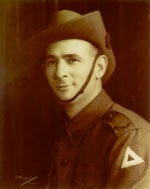
My father was born in Launceston, Tasmania in 1909. He was known as Hal (my aunt told me he hated his full name, particularly the Wilfred part).
My grandfather was a school teacher and so the family moved around Tasmania in my father's early years, settling permanently in Hobart in 1918. My father went to Hobart State High School and to the University of Tasmania for a short period before joining the Commonwealth Bank in Hobart. He excelled at sports playing first grade Australian Rules for the North Hobart Football Club in 1932-33 and A grade cricket (as a fast bowler) for the Newtown Cricket Club. In 1931 he played cricket for Southern Tasmania against Northern Tasmania.
He was transferred to the Bank's Head Office in Sydney in 1932 where he continued to play football for North Shore and cricket for Mosman. In 1934 he played in the (victorious) NSW Australian Rules team against Queensland.
He met my mother who also worked at the Bank in Martin Place and they were married in November 1939. Shortly before the wedding, my father was transferred again and so after their marriage, they made their home in Canberra.
He joined the Army in September 1941 and was at camp in Dubbo. He sailed for Malaya in January 1942 and I was born in April 1942. After his capture at Singapore, he was first placed in Changi but in March 1943 was sent to Tarsao prisoner of war camp in Thailand. In July 1944 he was brought back to Singapore and shipped to Japan, arriving at Fukuoka camp in September. In a card to my mother dated 1 December, he said that he had just recovered from a bout of pneumonia and was now in good health. However he died shortly after on 18 December 1944. My mother did not learn of his death until September 1945.
In writing this little piece, I realise there is a great deal I don't know about my father. His death was devastating for our family. My grandparents, whom I loved dearly, didn't talk to me about him. My mother did occasionally but these were not easy conversations. I think now she would have wished me to ask more questions. She was a strong woman and in many ways had a full life. She loved my father for the rest of her life, never remarried and died in 1975 in the house they came to in Canberra when they were first married.
From what I can piece together from family and friends, my father was a kind, strong man with a good sense of humour. I still have a few letters he sent to my mother and some cards from the prison camps. These were always optimistic, telling my mother he loved her and not to worry. He makes only one slight reference in his letters as to why he enlisted - "I have a clear conscience somehow - you know how it is". In Singapore, before his capture, he said he was the boss cook and his section were good scroungers. "Bailey, our best scrounger, has his eye on a porker, but I don't intend to cook it, he can do that himself."
In one of the letters my mother received after the war, a fellow POW said..."Hal was liked by every one that came in contact with him. He was a good soldier and a very good mate". Another letter said..."Hal died as a soldier, he was always ready to help his fellows in any way possible, and those are the ones who will never be forgotten, the ones who made it possible for others as well as myself to see it through."
(Australian War Section, Plot B Row D)
Written by Ms Anne Buttsworth, daughter of Halwyn Buttsworth
